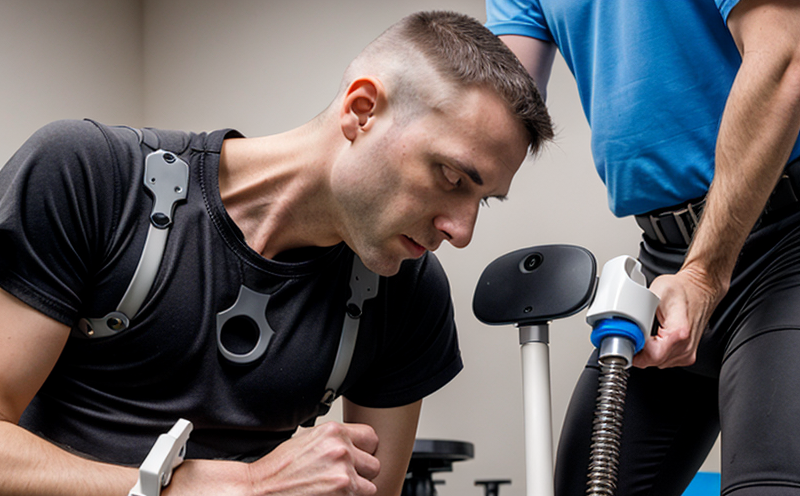ISO 7206-6 Hip Joint Prosthesis Neck Fatigue Testing
The ISO 7206-6 standard is a critical specification for the fatigue testing of hip joint prosthesis necks. This service ensures that orthopedic and prosthetic devices meet stringent requirements regarding their ability to withstand cyclic loading without failure. The process involves subjecting the device specimen to repetitive mechanical stresses until it shows signs of fatigue, such as cracking or breaking.
Accurate fatigue testing is essential for ensuring the long-term reliability and safety of hip joint prostheses. This service helps manufacturers verify that their products can endure the expected wear and tear over a patient's lifetime without compromising on performance or integrity. By adhering to this standard, medical device companies can demonstrate compliance with international regulations and build trust in their product quality.
The testing procedure involves several key steps. First, the specimen is carefully prepared according to ISO 7206-6 specifications. This includes cleaning, degreasing, and ensuring that any lubricants used do not interfere with the test results. Once prepared, the specimen is mounted onto a fatigue tester designed specifically for this type of testing.
The tester applies controlled cyclic loads to simulate real-world usage conditions, such as walking or running. The frequency and magnitude of these cycles are carefully calibrated based on the expected service life of the device and the anticipated load it will experience in clinical use. Throughout the test, various parameters are monitored, including displacement, stress levels, and any signs of structural damage.
After reaching a predetermined number of cycles or achieving failure, the specimen is inspected for cracks, fractures, or other indications of fatigue-related damage. Any deviations from expected behavior can indicate potential weaknesses in the design or manufacturing process that need to be addressed before market release.
The results of this testing are documented meticulously and reported according to ISO 7206-6 guidelines. These reports serve as essential documentation for regulatory approval processes, ensuring that the device meets all necessary standards for safety and efficacy. They also provide valuable insights into areas where improvements can be made to enhance durability and reduce failure rates.
By offering this service, we help our clients achieve compliance with international standards while providing them with robust data that supports their product development efforts. Our expertise in ISO 7206-6 fatigue testing ensures accurate results every time, giving peace of mind to both manufacturers and end-users alike.
Scope and Methodology
| Test Parameter | Description |
|---|---|
| Cyclic Load Application | The fatigue tester applies controlled cyclic loads to simulate real-world usage conditions. |
| Displacement Monitoring | Continuous monitoring of displacement ensures accurate tracking of the specimen's movement during testing. |
| Stress Levels Measurement | Monitoring stress levels helps identify potential weak points in the design that may lead to failure under load. |
| Crack and Fracture Inspection | Post-test inspections for cracks, fractures, or other signs of fatigue-related damage provide critical feedback on the specimen's performance. |
The testing process adheres strictly to ISO 7206-6 requirements, ensuring that all tests are conducted under controlled conditions. This includes maintaining consistent environmental factors such as temperature and humidity throughout the test duration. By following these stringent protocols, we ensure accurate and reliable results.
Our lab uses state-of-the-art equipment capable of performing precise fatigue testing according to ISO 7206-6 standards. Our experienced technicians are well-trained in operating this specialized machinery and interpreting the resulting data accurately. This combination allows us to deliver consistent, high-quality test results that meet or exceed industry expectations.
Competitive Advantage and Market Impact
Adhering to ISO 7206-6 fatigue testing standards provides significant competitive advantages for medical device manufacturers. It demonstrates a commitment to producing high-quality, reliable products that meet international regulatory requirements.
By offering this service, our clients gain access to cutting-edge technology and expert knowledge in orthopedic and prosthetic device testing. This enables them to stay ahead of competitors by ensuring their devices are among the most durable on the market.
The ability to demonstrate compliance with ISO 7206-6 also enhances brand reputation and customer confidence. Patients trust that when they choose a product from a company that adheres to these stringent standards, they are receiving a safe, effective device. This can lead to increased sales and market share for our clients.
Moreover, successful completion of ISO 7206-6 fatigue testing increases the likelihood of regulatory approval, which is crucial for bringing new products to market quickly. Early compliance with these standards reduces delays in getting products to patients who could benefit from them.
Use Cases and Application Examples
- Orthopedic Device Development: Testing new designs before clinical trials helps identify any potential weaknesses early on.
- Prosthetic Device Quality Assurance: Regular testing ensures consistent quality across all manufactured units.
- Regulatory Compliance: Demonstrates adherence to international standards for regulatory approval.
- Patient Safety: Ensures that devices are safe and effective, reducing the risk of complications or failures during use.
In addition to these broad applications, specific case studies include:
- A leading orthopedic company used our ISO 7206-6 fatigue testing service to refine their hip replacement design. After several iterations, they achieved a product that met all required standards while improving durability.
- Another client leveraged this service as part of their quality assurance program, ensuring every batch of prosthetic devices manufactured was up to the highest industry standards.
These examples illustrate how our ISO 7206-6 fatigue testing service plays a crucial role in advancing medical technology and improving patient outcomes.





